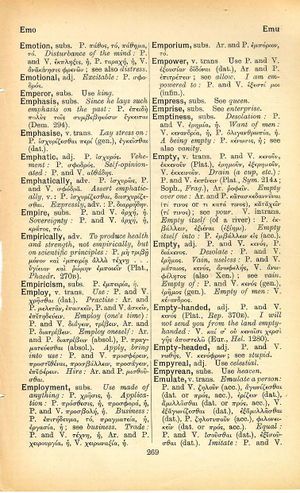emphasis: Difference between revisions
οὐ γὰρ εἰς περιουσίαν ἐπράττετ' αὐτοῖς τὰ τῆς πόλεως → for selfish greed had no place in their statesmanship
m (Text replacement - "link={{" to "link={{") |
m (Text replacement - "}}]]" to "}}]]") |
||
| Line 1: | Line 1: | ||
{{Woodhouse1 | {{Woodhouse1 | ||
|Text=[[File:woodhouse_269.jpg|thumb | |Text=[[File:woodhouse_269.jpg|thumb | ||
|link={{filepath:woodhouse_269.jpg | |link={{filepath:woodhouse_269.jpg}}]]'''subs.''' | ||
<b class="b2">Since he lays such emphasis on the past</b>: P. ἐπειδὴ πολὺς τοῖς συμβεβηκόσιν ἔγκειται (Dem. 294). | <b class="b2">Since he lays such emphasis on the past</b>: P. ἐπειδὴ πολὺς τοῖς συμβεβηκόσιν ἔγκειται (Dem. 294). | ||
}} | }} | ||
Revision as of 10:09, 15 August 2017
English > Greek (Woodhouse)
subs.
Since he lays such emphasis on the past: P. ἐπειδὴ πολὺς τοῖς συμβεβηκόσιν ἔγκειται (Dem. 294).
Latin > English (Lewis & Short)
emphăsis: is, f., = ἔμφασις, a figure of rhet.,
I emphasis, rhetorical stress (cf.: pondus, significatio), Quint. 9, 2, 64; 8, 2, 11; 8, 3, 86 al.
Latin > French (Gaffiot 2016)
emphăsis, is, f. (ἔμφασις), emphase [rhét.] : Quint. 8, 2, 11.
Latin > German (Georges)
emphasis, eos, Akk. im, Abl. ī, f. (εμφασις), I) der Anblick, rein lat. intuitio, Chalcid. Tim. 239 in. – II) der Nachdruck-, die Kraft des Ausdrucks, der noch mehr bedeutet u. in sich ahnen läßt, als er eigentlich ausspricht, die Emphase, Quint. 8, 2, 11 u.a. Diom. 456, 29 (wo Genet.). Serv. Verg. Aen. 2, 79 u. 394: expressius cum emphasi pronuntiare, Cassian. coll. 23, 16.

